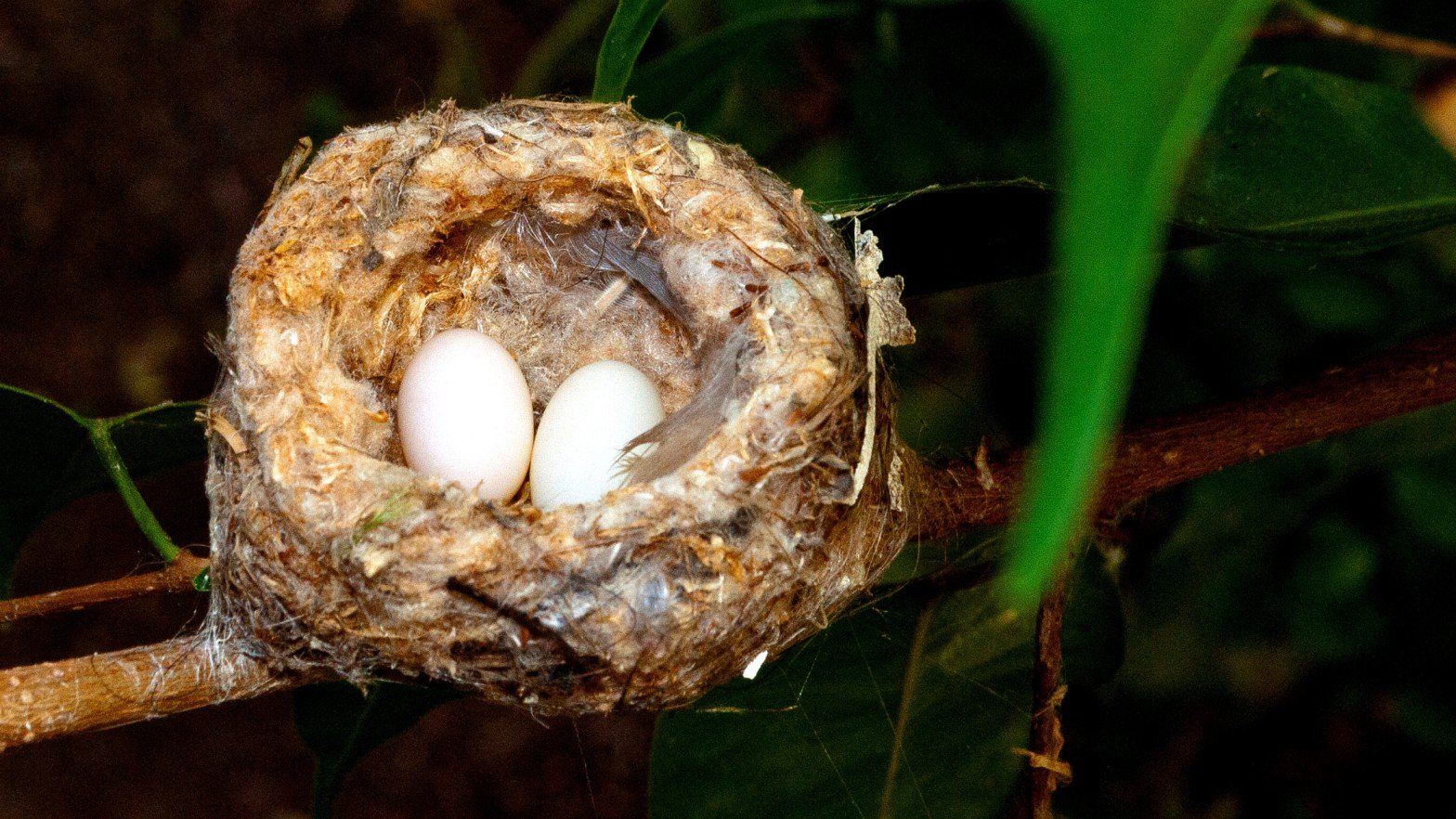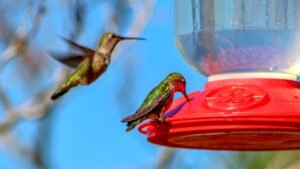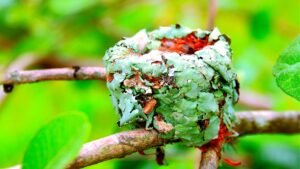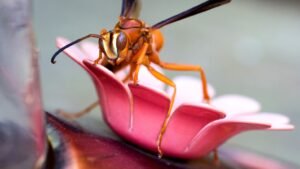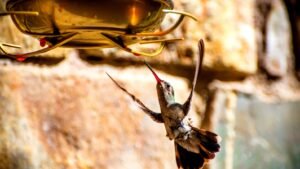Hummingbird eggs require 14 to 21 days to hatch fully. The length of the incubation depends mainly on weather conditions. In warmer climes, hummingbird eggs hatch after 14 days, but it could take as many as 21 days in colder climes.
It is good to understand the behavior of hummingbirds while incubating and hatching their eggs. This way, you can create the ideal conditions these little birds need for hatching their young ones.
When Does The Hummingbird Lay Its Egg?
Spring provides the ideal weather conditions for hummingbird nesting. Most hummingbirds begin to lay their eggs in May. However, nesting periods differ for migratory and non-migratory hummingbird species.
Non-migratory species like Allen’s hummingbirds lay their eggs late in November and early again in February. These species also lay several broods each year. On the other hand, migratory hummingbirds only manage between two to three broods each year.
How The Hummingbird Builds Its Nest
Female hummingbirds begin to build nests before mating, and they complete this process within a few days. To protect its young ones from natural predators such as snakes, lizards, and crows, the hummingbird prefers to set up its nest in tree branches with sufficient foliage cover.
Hummingbirds use spider webs to glue their nests to a suitable branch. Once completed, the hummingbird will line the freshly made nest with soft plant materials to ensure adequate insulation.
The female also covers the nest’s exterior with lichen to conceal it from predators.
How Many Eggs Does The Hummingbird Lay?
Hummingbirds lay only two eggs in the same brood, and they lay one egg at a time and require about three days to complete laying both eggs.
As many would expect, hummingbird eggs are very tiny. Eggs from Hummingbirds weigh less than a gram in most cases.
How The Brooding Process Works
Hummingbirds only start to incubate their eggs after they have laid both eggs. This way, the female ensures that both eggs hatch simultaneously.
Once incubation starts, the hummingbird remains in the nest for most of the day. This way, the eggs receive the heat they need to develop fully.
A broody hummingbird remains in the nest for about 84% of the time and never stays away for more than 10 minutes, even when they leave searching for food. You must maintain hummingbird eggs at 96 to 99 degrees Fahrenheit throughout incubation. Hence, the female tries to distribute heat evenly by turning the eggs with her beak and feet. The hummingbird turns its eggs several times a day throughout the incubation period.
What Happens After Hummingbird Eggs Hatch
Once the Hummingbird incubation process is complete, and the young hummers are ready to hatch, they begin to break the eggshells using the sharp hooks at the end of their beaks.
After both hummingbirds are hatched, the mother tosses the broken shells out of the nest to create sufficient room for the new hatchlings. The newly hatched hummingbirds are completely bald and blind, and they usually weigh less than a gram and depend on each other and the mother for warmth. Hence, if a single hummingbird hatches, it hardly survives.
Baby hummingbirds begin to develop pin feathers after the first week. These pin feathers help them stay warmer. Their size and weight also double within this period.
By the second week, baby hummingbirds start to open their eyes. At this point, the hatchlings also begin to grow their actual feathers.
How Young Hummingbirds Feed
Young hummingbirds require lots of protein and nectar to develop strong bones and fuel their young bodies. However, they cannot hunt for insects or visit flowering plants alone.
Hence, baby hummingbirds depend on their mother for their sustenance. A hummingbird feeds its young ones by regurgitating food into its mouth. Female hummingbirds will store little insects and nectar in their crop while foraging. It is from this crop that the mother regurgitates food directly into the hatchlings’ throats when she returns to the nest.
Hummingbirds will continue to feed their young ones even after they begin to forage for their food. They will only leave the young ones to fend for themselves after they are one-month old.
When Young Hummingbirds Leave The Nest
Young hummingbirds start to exercise their wings as soon as they are two weeks old. However, it takes up to a month before they attempt their first flight. Baby hummingbirds are ready to leave the nest five to six weeks after they hatch. They leave the nest one at a time and never return once they do.
Throughout the stay of young hummingbirds, female hummingbirds keep the nest completely free of poop and debris. This way, she ensures that young hatchlings have sufficient space and are free of bacterial infections.
Frequently Asked Questions
Can I Help Hummingbirds Egg Hatch?
Do not try to assist a hummingbird as it hatches. You might mean well, but you could be putting the hatchling at mortal risk.
If you wish to assist a broody hummingbird, provide abundant food sources near its nest. However, avoid giving food sources that could attract natural predators to the nest.
Do Hummingbirds Reuse Their Nests?
Hummingbirds do not reuse the same nest twice, rather, they build a new nest atop the former one.
Is It Okay To Touch Baby Hummingbirds?
Baby hummingbirds could fall from their nests when trying to move around and exercise their wings.
You can help stranded hummingbirds back into their nest. But it would be best if you handled them with utmost care as they are very delicate.

